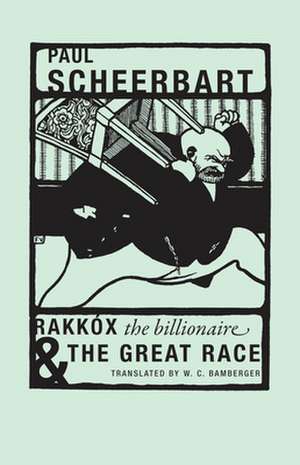Rakkox the Billionaire & the Great Race
Autor Paul Scheerbart Ilustrat de F& Vallotton, Felix Vallottonen Limba Engleză Paperback – 26 oct 2015
Paul Scheerbart (1863-1915) was a novelist, playwright, poet, newspaper critic, draftsman, visionary, proponent of glass architecture and would-be inventor of perpetual motion. Dubbed the "wise clown" by his contemporaries, he opposed the naturalism of his day with fantastical fables and interplanetary satires that were to influence Expressionist authors and the German Dada movement, and which helped found German science fiction.
Preț: 83.58 lei
Nou
15.100€ • 16.64$ • 13.41£
Carte indisponibilă temporar
Specificații
ISBN-10: 1939663121
Pagini: 112
Dimensiuni: 114 x 178 x 10 mm
Greutate: 0.14 kg
Editura: Wakefield Press
Descriere
Two novellas from the inventor of perpetual motion and godfather of German science fiction. "Rakkóx the Billionaire" (1901), a "Protean Novel," tells the tale of a multibillionaire who abandons his militaristic aspirations (and such Quixotic fantasies dreamed up by his Department of Invention as the utilization of herring in submarine warfare) in favor of a plan to convert a cliff into a work of architectural art. "The Great Race" (1900), a "Development Novel in Eight Different Stories," describes an intergalactic competition among worm spirits who wish to separate from their stars and achieve true autonomy in a ferocious race of winged sleds, cannon-airships, sky-high wheel-shaped vehicles and 100-mile-tall stilt machines, whose winners will be transformed into gods. Veering from humorous, aggressive slapstick to ethereal visions of cosmic philosophy, Scheerbart's fiction offers something of a cartoon space odyssey, and resembles that of no other writer, either of his time or our own.
Paul Scheerbart (1863-1915) was a novelist, playwright, poet, newspaper critic, draftsman, visionary, proponent of glass architecture and would-be inventor of perpetual motion. Dubbed the "wise clown" by his contemporaries, he opposed the naturalism of his day with fantastical fables and interplanetary satires that were to influence Expressionist authors and the German Dada movement, and which helped found German science fiction.
